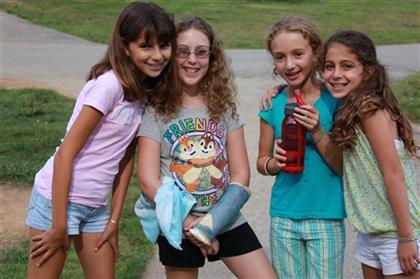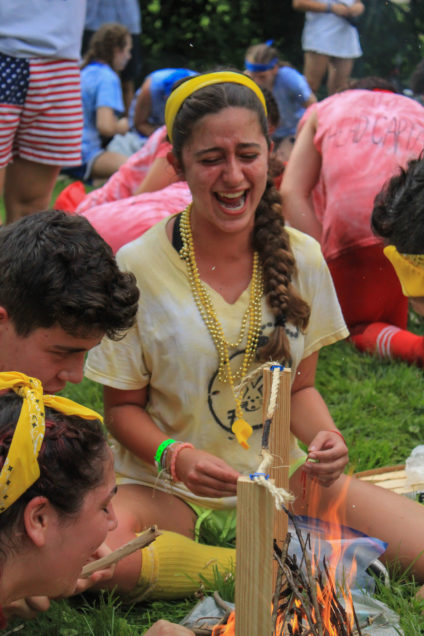
With stomachs full of buttered and jammed biscuits, Sollelim me and her friends walked back to lower roads, hiking up to tzrif (bunk) 20 to begrudgingly participate in nikayon (cabin clean up) after breakfast. Her bunkmates shuffled in, carefully examining the nikayon chart to see which jobs were delegated to which person on that day. Under the name, “Shiri” read “dustpan, יָעֶה.” She sat on her bottom bunk in the corner, twiddling her thumbs until the sweeper was ready to sweep the dust pile into the dustpan. While the hour-long morning cleanup session seemed tedious and boring, at the end of the perek (period), the tzrif was near spotless. Without everyone completing their jobs, we would not have had the positive outcome of a clean tzrif. As a 5th grader, I struggled to understand why we had to perform our chores from the nikayon chart. Now I know that Nikayon served me with my first dose of humility, teaching me that Camp is about togetherness and community building. If my friends and I could individually put our wants and needs aside for an hour to help clean up around the tzrif, we would all benefit from living in a clean space.
 During Session Aleph of 2017, Gesher me felt the stress of planning the highlight of everyone’s summer, Yom Sport. My team and I worked tirelessly for weeks, making every Chadar Ochel (Dining Hall) decoration, composing every song and cheer, and planning every activity. Stepping into a leadership position on the day raised the stakes, and I could practically feel the weight of every chanich (camper) on my team on my shoulders. I struggled to balance the stress of planning Yom Sport at first. But, as I watched our day unfold from breakout to closing ceremonies, I was incredibly humbled by every person’s effort in AidatHaGesher, making the day seamless and lots of fun for the rest of the chanichim (campers) at Camp. With the help of every single person in my Gesher group and every single camper on my team, Yom Sport 2017 was one of my most precious, fulfilling days at Camp.
During Session Aleph of 2017, Gesher me felt the stress of planning the highlight of everyone’s summer, Yom Sport. My team and I worked tirelessly for weeks, making every Chadar Ochel (Dining Hall) decoration, composing every song and cheer, and planning every activity. Stepping into a leadership position on the day raised the stakes, and I could practically feel the weight of every chanich (camper) on my team on my shoulders. I struggled to balance the stress of planning Yom Sport at first. But, as I watched our day unfold from breakout to closing ceremonies, I was incredibly humbled by every person’s effort in AidatHaGesher, making the day seamless and lots of fun for the rest of the chanichim (campers) at Camp. With the help of every single person in my Gesher group and every single camper on my team, Yom Sport 2017 was one of my most precious, fulfilling days at Camp.
This week’s Parsha, Vayikra, starts the beginning of a new book in the Torah. At the start of the chapter, G-d calls Moses to enter his Sanctuary for the first time. The verse states, “Vayikra-el Moshe,” “And G-d called to Moses.” The word “Vayikra” is written down in the Torah with a small aleph instead of a normal-sized one. According to Baal HaTurim’s commentary, the reduction in the aleph size symbolizes an integral part of Moses’s character, humility. Humility is a characteristic praised in the Torah. While the Talmud teaches us not to be too extreme, this teaching does not apply to the concept of humility. Rather, true humility is practiced at extremes by some of the chief influences of Judaism, like Abraham, Moses, Sanhedrin Rabbi Hillel, Maimonides and many more.
Humility is a fundamental part of the Jewish identity shaping values that we learn at Camp, helping us to understand something much greater, kehillah (community).
Beyond what we learn in our Yahadut (Judaics) classes and tzevet Limmud (staff learning), humility is a fundamental part of the Jewish identity shaping values that we learn at Camp. While every chanich and every tzevet member is given a unique opportunity to shine at Ramah Darom, Camp teaches us humility so that we can understand something much greater, kehillah (community).
This past year, we’ve had to internalize and apply the humility we learn at Camp differently. Staying quarantined, safely distanced and masked throughout this already year-long pandemic, has taught us humility. Understanding that to protect our family, friends, and strangers, we are obligated to take such measures. While many of us were upset about the loss of a Kayitz (Summer) 2020 experience face-to-face, humility helped us understand that to keep the members of our kehillah as safe as possible; we had to go =virtual. The good news is that hundreds of chanichim participated in various creative online programs during Kayitz Babayit (Summer at Home).
 The lessons of humility I have learned through nikayon, Yom Sport and global crises have strengthened me and I believe our whole kehillah. And, I cannot wait to be humbled by the love and strength in our kehillah in our much-needed return back to Camp for Kayitz 2021.
The lessons of humility I have learned through nikayon, Yom Sport and global crises have strengthened me and I believe our whole kehillah. And, I cannot wait to be humbled by the love and strength in our kehillah in our much-needed return back to Camp for Kayitz 2021.
Shiri Abramson, Ramah Service Corps Fellow